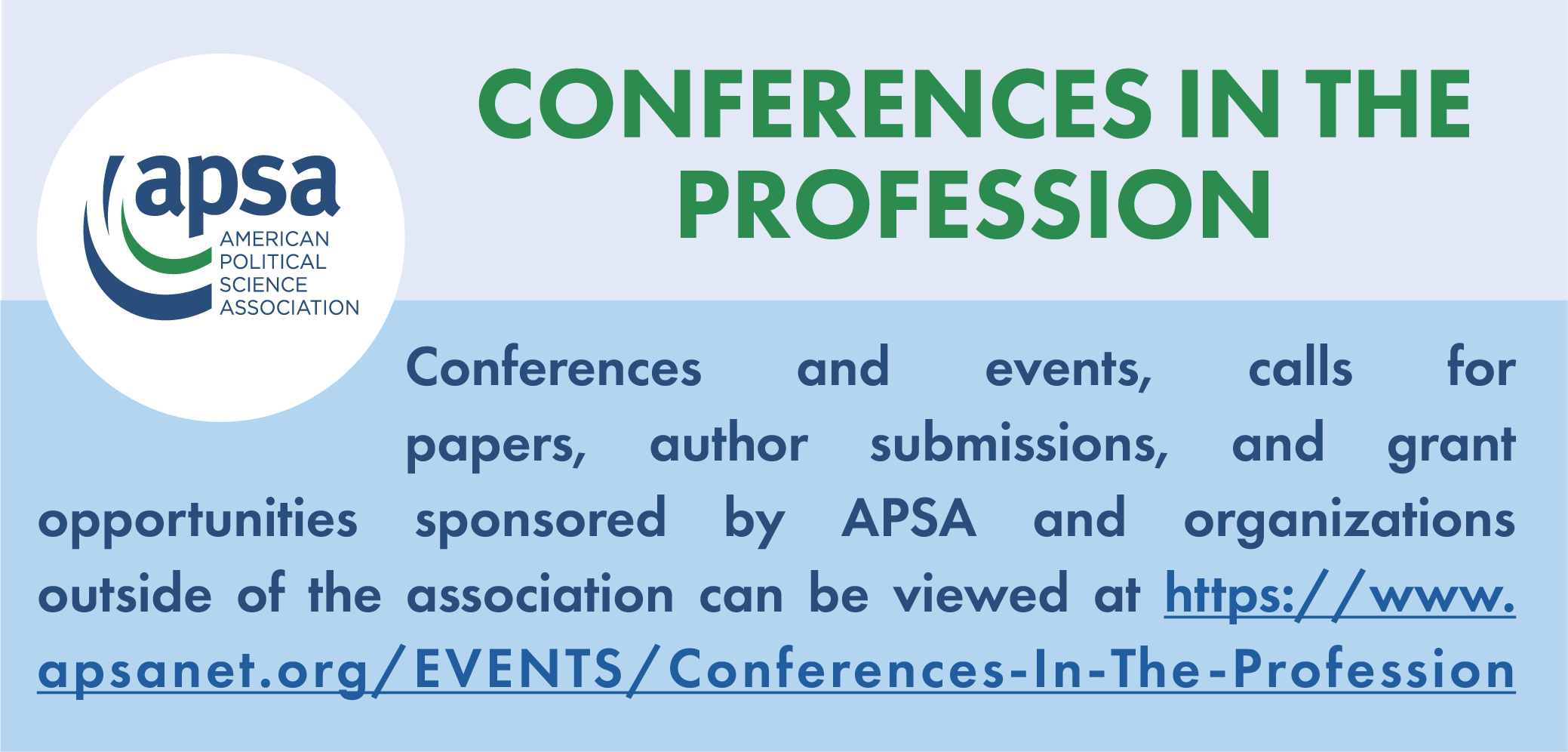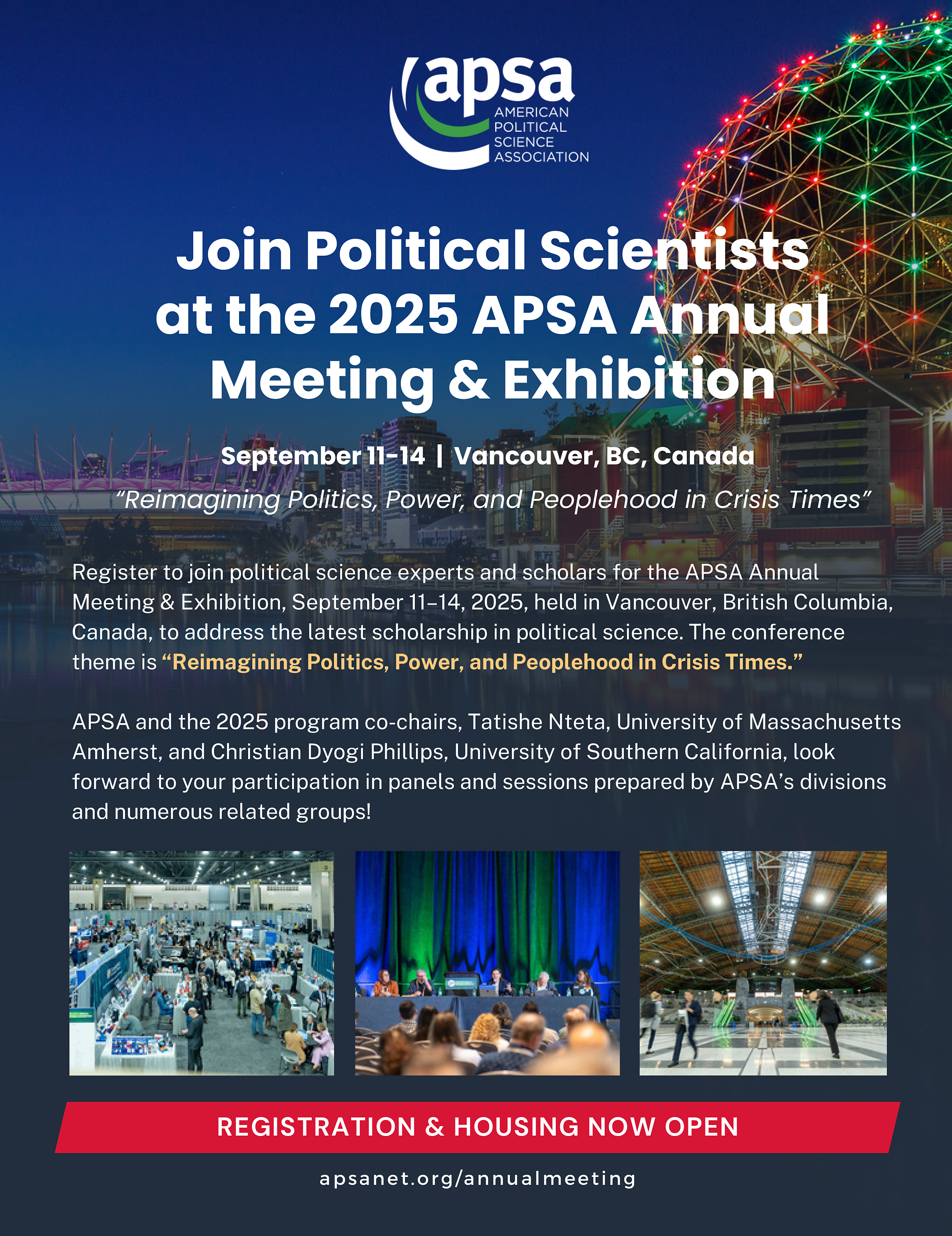Since 2003, the Centennial Center for Political Science and Public Affairs has provided APSA members with a collaborative space in Washington, DC, to advance research and teaching. The Visiting Scholars Program offers a quiet workspace, access to policy and research institutions, and networking opportunities. Located near Dupont Circle, the Center features furnished shared offices, high-speed internet, printing services, conference rooms, a reference library, and a break room with complimentary coffee and tea. Scholars also receive APSA staff support for organizing professional events.
Residencies range from a few days to several months, with no cost for APSA members. Applications are accepted on a rolling basis. Whether you’re conducting fieldwork, writing, or engaging with DC’s rich political and academic resources, the Centennial Center offers an ideal environment to support your work.
Learn more and apply: https://connect.apsanet.org/centennialcenter/centennial-center-visiting-scholars/
Questions? Contact: centennial@apsanet.org
Through their residency reports, recent visiting scholars highlighted the Center’s role in fostering focused and productive research in a supportive academic environment.
RESIDENCY REPORT: LUCIA VITALE, UNIVERSITY OF CALIFORNIA, SANTA CRUZ
APSA Visiting Scholar, Fall 2023–Winter 2024
After wrapping up a Fulbright in the Dominican Republic and a shorter-than-expected fieldwork stint in Port-au-Prince Haiti, I applied to be a Visiting Scholar at the Centennial Center. During my residence in Washington, DC I was able to complete dissertation data collection that was impossible to complete in Haiti due to increasing political violence in the Haitian capital city. The program grew my involvement in APSA as an organization, which began initially with a virtual conference presentation during the annual 2020 “pandemic” meeting. As a PhD Candidate in the Politics Department at the University of California, Santa Cruz, being connected to the Centennial Center while out on the East Coast finishing fieldwork came with unexpected benefits, too, such as connecting with a supportive community of intellectually curious scholars.
By comparing across the Dominican-Haitian border, my mixed methods dissertation project aims to explain which factors impact health care access in rural border areas. In doing so, it builds towards a theory of “Assembled Access,” which describes the ways that patients construct primary health care access in fragmented health systems, and in an increasingly mobile and migratory world. To do so, I measure how border residents on both sides of the national border navigate between primary health services provided by one’s own government, foreign governments, NGOs, charity medical missions, and private care (among other providers). The project collects data at three scales of analysis: the local, the national, and the transnational. In summer of 2023 I completed a 10-month Fulbright and with it, all data collection activities at the local and transnational scales, and at the national scale in the Dominican Republic. All that remained was the national scale in Haiti, which was to be accomplished by conducting semi-structured interviews in Port-au-Prince, Haiti. Shortly after moving to Port-au-Prince, I was evacuated by the US Embassy due to increasing gang violence in the capital city, and was thus unable to complete data collection.
Thanks to my time as a visiting scholar during the fall and winter of 2023-2024, I was able to finish data collection by taking advantage of travel by Haitian government officials through Washington, DC. This type of travel increased during this time due to US involvement in coordinating a “multinational security support” force, or “MSS” deployment to Haiti. The residency not only provided the opportunity to work out of the APSA DC office and complete data collection, but it also allowed me to present my work to a multisector audience at the conclusion of my stay. The Centennial Center team supported the event by planning logistics and catering a lunchtime talk in February of 2024. The talk itself was attended both in-person and virtually by people representing different disciplinary backgrounds in academia, the non-profit and NGO sector, activist groups, government, as well as by professionals based out of the US, the Dominican Republic, and Haiti. The diverse audience resulted in a productive and insightful question-and-answer session following the talk.
Besides the more tangible outcomes of data collection and a sponsored talk, perhaps the best part of my time in-residence was building upon my previous involvements with APSA. As mentioned above, my very first involvement with APSA was a virtual conference presentation during COVID. Since 2020, my involvement with the Association grew, and I became an active member of both the Migration and Citizenship, and Health Politics and Policy Sections. During the 2023-2024 academic year I served on the Executive Committee of the Health Politics and Policy Section as their first ever Graduate Student Representative. Along with the President and Secretary of the Section, we aimed to increase junior membership in the Section. Towards this goal, I organized two junior scholar panels for the fall annual meeting in Philadelphia, and an inaugural virtual paper workshop for junior scholars of the Section. With the Migration and Citizenship Section I have participated in a pre-conference workshop, and in a special conference-within-a-conference event held during the Southern Political Science Association (SPSA) meeting. I was also lucky enough to receive support from both the Spring and Summer Centennial Center Research Grants (CCRG), which supported fieldwork activities in Haiti and DC. During residency, I was able to build upon these previous involvements with the Association.
My time in-residence expanded my knowledge of and involvement with APSA in meaningful ways. Being located down the hall from folks involved with the Teaching and Learning Center; the Research Grants Office; the Diversity, Equity, Inclusion and Strategic Initiative; the Meetings and Events team; and with different APSA publications increased my understanding of APSA’s organizational structure. Importantly, it connected real people to the various centers that I had previously only known of by name. Being far from my own academic community out West, the Visiting Scholars Program allowed me to connect with a whole community of scholars and staff members that happily met for lunch, coffee, and shared their own research interests while listening to mine. These involvements have increased my knowledge of the discipline and introduced me to new work by new scholars. The connections have better informed my own work, and allowed me to build community outside of my University of California homebase. It has been a true joy to get to know APSA at this level!
RESIDENCY REPORT: BOGDAN MAMAEV, GRIFFITH UNIVERSITY
APSA Visiting Scholar, Fall 2023–Winter 2024
The Visiting Scholars Program at the Centennial Center was a fantastic opportunity for networking, getting to know the people behind APSA, and understanding how the organization operates. It allowed me to engage in discussions with people from various fields, get career advice, and learn about opportunities within the association. Plus, visiting the historic Dupont Circle location and connecting with the individuals who contribute to APSA’s success was truly inspiring.
The location and flexible office access were perfect for networking, especially with the office being so close to GWU. I attended several seminars related to my research and had productive meetings with senior academics, PhD candidates, and early career researchers. Having a cosy office with all the necessary equipment to continue my research while in DC was super convenient. The flexibility to create my own schedule was also crucial, particularly after adjusting to the new time zone.
Another highlight was the chance to present my research. APSA, especially Rosalie Rubio and Jennifer Aaronson, helped me organize my Lunch & Learn workshop. I invited all APSA staff and several junior and senior scholars from my field to boost my visibility as an early career researcher and potentially collaborate with some attendees in the future. Practicing my presentation skills outside my home institution, articulating my research, and discussing it in detail afterwards was a significant milestone for me as a late-stage PhD candidate. I am incredibly grateful to APSA for this opportunity.
The conversations about my research, interactions with APSA members, and participation in a workshop led by another visiting scholar were invaluable experiences. They significantly contributed to my well-being, research progress, networking skills, and overall perception of academia. In just four weeks, I connected with people from my field, made substantial research progress, and, most importantly, made many new friends who supported me. This includes Elizabeth Meehan, whose insights on the job market and opportunities were priceless, and Isabel Thompson, who became a fantastic office buddy—and everyone else for the engaging office and hallway conversations. ■



